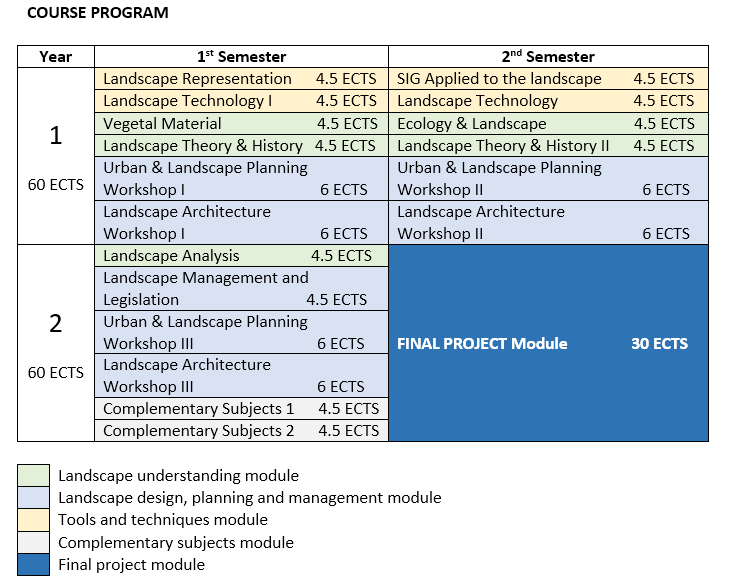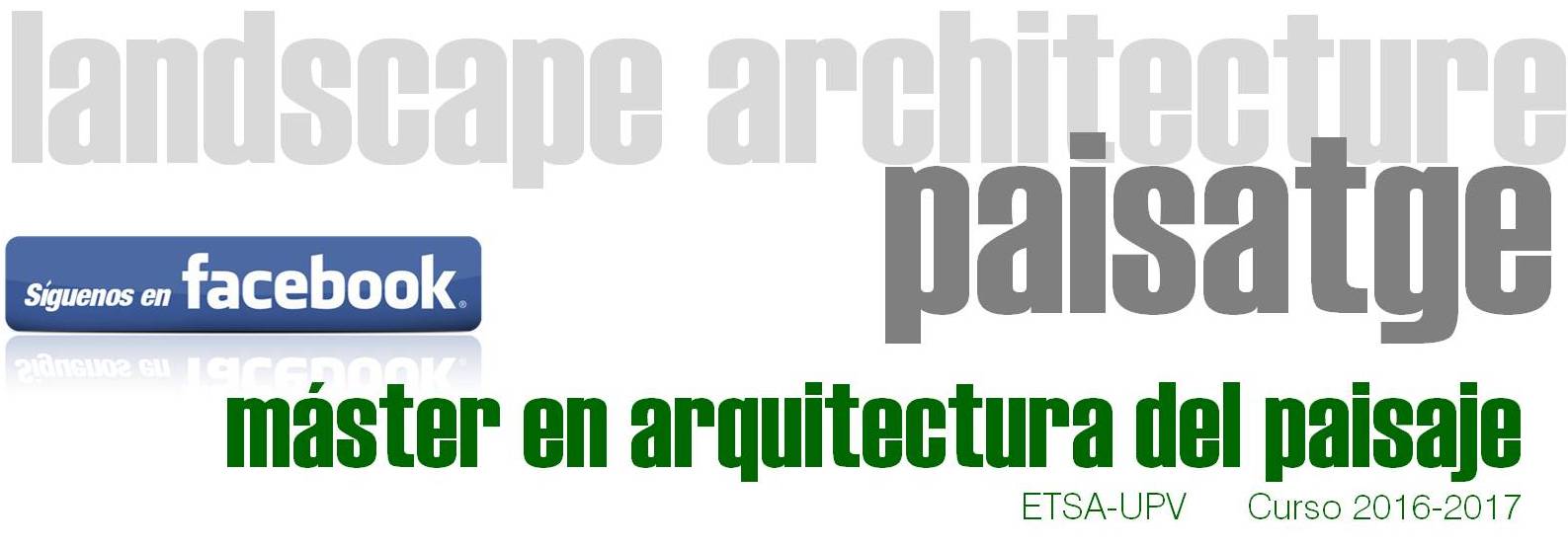 Vera (València) Campus, Universitat Politècnica de València
Vera (València) Campus, Universitat Politècnica de València
Master's Degree in Landscape Architecture
120 credits
Credit 35,34 €
(2024/2025)
0 openings
(2024/2025)
Extinguishing degree. Not enrolable for the 25-26 academic year.
Introduction
The European Landscape Convention, adopted in the year 2000 in Florence by the Council of Europe, came into force in 2004 and was ratified by Spain in 2007, coming into force in Spain in 2008. The aim of the convention is to encourage public authorities to adopt local, regional, national and international policies and measures to protect, plan and manage European landscapes in order to preserve and improve their quality and to lead the general public, the institutions and the local and regional authorities to acknowledge the value and importance of landscape and to take part in any public decisions related to it.
In the Valencian Community, the 2014 Law on the Use of Land, Urban and Landscape Planning considers landscape as the main structural element that then guides urban planning through the concept of Green Infrastructure, which encompasses all levels of the territory and its planning.
Providing university level training in this field is therefore particularly relevant for society, as both the public sector and private companies require highly qualified professionals with a multidisciplinary background to develop and implement the tools required by the aforementioned Law. At European level, this training is generally referred to as landscape architecture and is part of long standing academic programs in many countries around the world.
The underlying reason that explains the inclusion of landscaping amongst the academic courses offered by the School of Architecture of the Polytechnic University of Valencia is the leap forward in this field over the last decades. It has evolved from its traditional dimension linked to horticulture and gardening to embrace an architectural-urban dimension that places landscaping in the sphere of design disciplines, and includes all levels of this, from design to architectural plans, and from the urban plans to land use.
Setting an architectural-urban dimension of landscape architecture is perfectly compatible with an open recognition of it as a multidisciplinary field that includes different components: design disciplines, creative arts, technology, environmental sciences and social sciences.
Ultimately, training in landscape architecture is highly transversal in nature, which is why it is being standardised at the European Union level as the LE:NOTRE project. It is coordinated by the European Council of Landscape Architecture Schools (ECLAS), involving more than one hundred universities. The LE:NOTRE project, together with the International Federation of Landscape Architecture (IFLA) recommendations for training in landscape architecture have been the main benchmarks for setting the syllabus of this Master's course.
Objectives
Ensuring that the degree is in line with the European framework and current legislation, the aim of the Master's programme in Landscape Architecture is to make sure students acquire advanced, specialised and multidisciplinary training that focuses on the analysis, planning, design, management and preservation of urban and territorial landscapes.
The fields of knowledge linked to these educational objectives are the following:
-
Urban and landscape planning, management and design.
-
Landscape design and planning as a tool for urban and territorial management.
-
Landscape theory, composition and representation: cartographic, visual, historic and cultural analysis and evaluation of the urban and territorial landscape.
-
Regeneration, restoration and rearrangement of urban, cultural and infrastructural landscapes.
-
Construction, management and preservation of urban and territorial landscapes.
-
Ecology, environmental sciences and plant material applied to landscape design and planning.
Number of credits
The Landscape Architecture Master consists of 120 ECTS credits, of which 30 correspond to the Master's Final Project.
Program structure
The program's modules and subjects are briefly described down below.
-
a) LANDSCAPE UNDERSTANDING Module:
The Landscape Understanding Module is worth 22.5 ECTS credits and consists of two compulsory subjects: Landscape and the Environment, worth 13.5 ECTS credits and Landscape Theory and History, worth 9 ECTS. This module offers basic training in two supplementary fields: historical-cultural and the environmental sciences, with a focus on landscape in both cases. -
b) LANDSCAPE DESIGN, PLANNING AND MANAGEMENT Module:
The Landscape Design, Planning and Management Module consists of the following compulsory subjects: Landscape Design and Landscape Planning and Management, each of which is worth 18 ECTS. This is a design based module that will be taught as a workshop. -
c) TOOLS AND TECHNIQUES Module:
The Tools and Techniques Module is worth 27 ECTS and consists of the following compulsory subjects: Landscape Representation, worth 9 ECTS, Landscape Technology, worth 13.5 ECTS and Landscape Legislation and Management, worth 4.5 ECTS. This is a technical instrumental module that provides graphic, technological and regulatory tools. -
d) COMPLEMENTARY SUBJECTS Module:
The Complementary Subjects Module is worth 9 ECTS and consists of only one subject: Complementary Landscape Subjects. This subject matter will include a series of optional courses with the aim of taking a close look at specific issues within the different subjects included in the program, as a first step towards specialization. The optional courses offered within Complementary Subjects Module will depend on the teaching capacity of the departments involved and on demand. Thus, the courses will not be offered if the teaching load of any of the departments involved is excessive or if low levels of enrolment are expected. -
e) FINAL PROJECT Module:
The Master's Final Project Module is worth 30 ECTS and consists of only one subject: the Master's Final Project, which can be begun once all the necessary credits have been obtained and which involves preparing, presenting and defending an original and individual exercise before an academic jury. The exercise involves designing, planning and managing a landscape using all the skills acquired in the master degree in a professional format and complying with the applicable administrative, urban and technical regulations.
The Master's Final Project Module will therefore fulfil the recommendations of the ECLAS Guidance on Landscape Architecture Education document. The Tuning Project ECLAS-LE:NOTRE that recommends a minimum of 30 ECTS for this module.

Through this structure, the proposed academic program meets the requirements to be accredited by the International Federation of Landscape Architecture (IFLA). These requirements are indicated in the IFLA Charter for Landscape Architectural Education, that recommends that Landscape Architecture Master programs be taught at university level and be worth at least 120 ECTS, of which a minimum of 50 % should consist of design work. This is also recommended by the ECLAS Guidance on Landscape Architecture Education. The Tuning Project ECLAS-LE:NOTRE.
Through the proposed structure, the ECTS design type are the sum of the credits allocated to the following subjects: landscape design (18 ECTS), landscape planning (18 ECTS) and the master's final project (30 ECTS), making a total of 66 ECTS , giving a proportion of 55 %. The breakdown by subjects is a reflection of the interdisciplinary nature and the integration of theory and practice that are characteristic disciplinary features of Landscape Architecture in the ECLAS Guidance on Landscape Architecture Education. The Tuning Project ECLAS-LE:NOTRE.
Intended Students
This master degree will preferably be intended for students with the following degrees:
-
Degree in Architecture / Fundamentals of Architecture.
-
Degree in Technical Architecture / Building Engineering.
-
Degree in Agrifood Engineering and Rural Areas.
-
Degree in Forest Engineering and the Natural Environment.
-
Degree in Civil Engineering.
-
Degree in Public Works Engineering.
-
Those holding any university degree equivalent to the aforementioned.
Other graduates who can prove three years of professional experience in a prestigious public or private company linked to landscaping may also be accepted in the course after the Master's Academic Commission evaluates their CV. Similarly, students who have graduated from Master degrees in the equivalent subjects to the degrees mentioned may also be accepted in the course.
Specialization
This course does not establish any predefined specialization, but an initial stage of specialization can be developed through the optional courses in the COMPLEMENTARY SUBJECTS Module.
Admission criteria
Admission criteria will be based on the following aspects:
-
Adequacy of the academic transcript with the contents of the Master's degree.
-
Academic transcript.
-
Work experience in the fields of architecture, engineering, urban planning, gardening and landscaping.
Teaching is entirely in Spanish, so in order to be accepted on to the course, students coming from countries in which Spanish is not an official language must provide certification in Spanish of at least a B2 level on the Common European Framework of Reference for Languages.
Organiser
Superior Technical School of Architecture
Participants
Architectural Composition Departments, Architectural Constructions, Graphic Architectural Expression, Economy and Social Sciences, Agroforestry Ecosystems, Sculpture, Rural and Agrifood Engineering, Mechanics of Continuous Media and Theory of Structures, Business Organization, Painting, Architectural Projects, Chemistry and Urban Planning.
Contributing entities
Blanca-Cemex Chair, Cerámica-Ascer Chair, Sustainable Municipalities Chair, National Brotherhood of Architects, Valencian Community College of Architects, Instituto Valenciano de la Edificación (Valencian Building Institute), Housing, Public Works and Integration of the Territory Regional Ministry.











